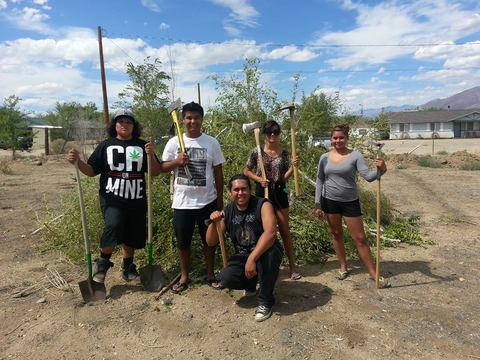Big Pine Paiute Tribe
 The ancestors of the Big Pine Paiute Tribe inhabited the Owens Valley in Eastern California for millennia, “[living] in harmony with all organisms through a lifestyle based on traditional subsistence…[and gathering] resources from the earth in a varying schedule which relied on seasons and locations.”1 Today the Big Pine Paiute Tribe continues their ancestors’ relationship to their environment through its Sustainable Food System Development Project, which has already planted 40 fruit trees, established multiple vegetable plots, created an organic seed bank, and founded a farmers’ market. Indeed, the program’s community garden “rests on the site of an ancient Paiute irrigation ditch network that once spread throughout the Owens Valley.”2 Just as importantly, the tribe works to protect the valley’s water, air, and land resources. In the words of Alan Bacock, Water Program Coordinator at Big Pine, the tribe’s efforts are “not only for the benefit of people, but also for all other organisms which coexist with us..”
The ancestors of the Big Pine Paiute Tribe inhabited the Owens Valley in Eastern California for millennia, “[living] in harmony with all organisms through a lifestyle based on traditional subsistence…[and gathering] resources from the earth in a varying schedule which relied on seasons and locations.”1 Today the Big Pine Paiute Tribe continues their ancestors’ relationship to their environment through its Sustainable Food System Development Project, which has already planted 40 fruit trees, established multiple vegetable plots, created an organic seed bank, and founded a farmers’ market. Indeed, the program’s community garden “rests on the site of an ancient Paiute irrigation ditch network that once spread throughout the Owens Valley.”2 Just as importantly, the tribe works to protect the valley’s water, air, and land resources. In the words of Alan Bacock, Water Program Coordinator at Big Pine, the tribe’s efforts are “not only for the benefit of people, but also for all other organisms which coexist with us..”
Besides developing sustainable practices, the Big Pine Paiute Tribe has departments focusing on issues such as housing, education, economic development, and tribal historic preservation. Its recently opened Wellness Center, located at the site of its long-defunct casino, features fitness equipment, a yoga room, a youth activity room, and a dance floor. Annual Summer Youth Employment Programs, organized by a consortium of tribes and tribal nations, provide youth with summer employment and valuable skills and experience. Though a tribe of only 500 people living on 300 acres of land, then, the Big Pine Paiute Tribe is a model for other tribes in the region and beyond.
Once again, the Big Pine Paiute Tribe is taking the initiative as it prepares to operate its own low-power FM station. With this powerful tool, the tribe will be able to publicize environmental concerns, provide emergency broadcasting services, encourage preventative health measures, and promote traditional music. Other goals of the station include teaching the Paiute language and fostering intergenerational communication through interviews of tribal elders conducted by youth. Planned programming for the station includes a daily Big Pine Tribal News Hour that will include discussions of local tribal issues, promotion of local events, national Native news from sources like the Indian Country Today Media Network, and content produced not only by the tribe’s official departments, but also by local artists and business owners.
In creating a tribal radio station, the Big Pine Paiute Tribe is drawing inspiration from many other tribes in the US. Currently, 53 Native stations are broadcasting around the country, providing a an invaluable resource to their tribes. Richard Davis, manager for KUYI Hopi Radio, explains: “Outside in the mainstream culture, a lot of folks think radio is dead, but tribal radio is very strong. We really are the lifeblood of what’s going on.”3 Like many tribal stations in rural areas, the Big Pine Paiute Tribe’s station will be one of the few providing local content, Native or otherwise, in the region. The need for a perspective that is both local and Native is particularly pressing, given that Inyo County’s population is 12.7% Native, a percentage that is six times higher than the percentage of Native people in the state of California. Without a doubt, the station, in bringing a local, Native perspective to the region’s media landscape, will advance the Big Pine Paiute Tribe’s goal of living prosperously and sustainably for generations to come.
1 www.bigpinepaiute.org
2 http://thesheetnews.com/2013/07/15/new-garden-in-big-pine-brings-paiute-tribe-back-to-its-roots/
3 http://projects.aljazeera.com/2014/reservation-radio/index.html
